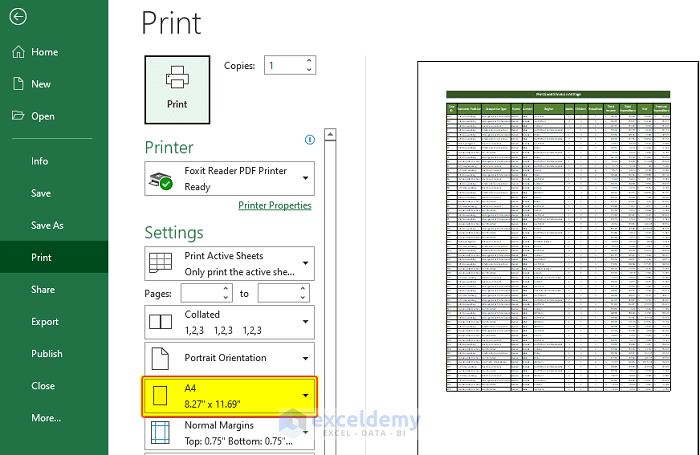5 Tips to Ensure Excel Sheet Prints on One Page

When you’re working with Excel spreadsheets, there’s a high chance you've encountered the common dilemma of your data sprawling across multiple pages when printed. While this might be fine for some situations, in many professional settings, a concise, single-page report can be much more appealing and practical. Here are five essential tips to ensure your Excel sheet prints on one page effectively and efficiently.
Adjust Page Setup Options

The first step in optimizing your Excel sheet for one-page printing involves tweaking the Page Setup options. Here’s what you can do:
- Page Orientation: Switch to Landscape if your data fits better horizontally. This can often accommodate more columns without extending to additional pages.
- Scale to Fit: Navigate to the ‘Scale to Fit’ group in the Page Layout tab. Here, you can adjust the scaling settings to fit all your data onto one page by percentage or to fit width/height.
- Margins: Reducing the margins can save significant space. Go to ‘Margins’ in the Page Layout tab and customize it or choose ‘Narrow’ for predefined smaller margins.
Modify Column Widths

Your columns might be wider than necessary, leading to wasted space. Here are steps to optimize:
- Select all columns or the specific columns you wish to adjust.
- Double-click the right boundary of the column header to auto-fit the column width to its content, or drag it manually.
- Ensure there’s no unnecessary gap between columns by dragging or auto-fitting.
💡 Note: Be cautious not to make columns too narrow, as it might cut off important data or make it illegible.
Reduce Font Size and Style

Font settings can take up a lot of space in your Excel sheet:
- Consider reducing the font size. A decrease from 12 to 11 points can make a big difference.
- Choose a sans-serif font like Arial or Calibri which are less space-consuming compared to serif fonts.
- Remove bold formatting where unnecessary to decrease the space taken by text.
Optimize Worksheet Content

Reducing the amount of data or reorganizing it can be effective:
- Delete or hide unnecessary columns or rows.
- Merge cells if it logically groups related data.
- Consider transposing data from rows to columns if it fits better within a single page.
- Reduce header and footer text or remove unnecessary elements.
| Action | Impact |
|---|---|
| Removing unused rows/columns | Reduces page count by eliminating blank space. |
| Merging cells | Can consolidate headers or related data into one cell, saving space. |
| Changing data structure | Fitting data in fewer rows or columns can reduce page breaks. |

Print Preview and Adjustment

Before printing, it’s crucial to use the Print Preview feature:
- Click on ‘File’ > ‘Print’ or use the keyboard shortcut Ctrl+P to view how your document will appear when printed.
- Observe page breaks and adjust any settings like orientation, scaling, or margins as necessary.
- Use the ‘Page Break Preview’ to see where Excel automatically places page breaks and manually adjust them if required.
📝 Note: Remember that what looks fine on the screen might not translate perfectly to paper, so always double-check your settings.
By implementing these strategies, you can ensure that your Excel sheets print on one page, keeping your presentation neat and organized. Each step allows you to control how your data is displayed, ensuring that your professional documents maintain their intended appearance and readability. A single-page printout not only looks more polished but also conveys the information in a clear, concise manner, making it easier for others to understand and absorb the data at a glance.
Why does Excel sometimes print on multiple pages even with scaling?

+
Excel might struggle to fit all data onto one page if the sheet contains significantly more rows or columns than a page can hold, or if the data itself is too spread out. Adjusting scale, layout, or even the data structure might be necessary.
Can I manually set the page break in Excel?

+
Yes, you can manually adjust page breaks by going into Page Break Preview mode. Drag the breaks to set them where you want, allowing for a more controlled printing layout.
What if I have too much data to fit on one page?

+
If your data is too extensive for one page, consider summarizing or filtering the data to display only what’s necessary for the printout. You could also print on multiple pages and manually combine them into a report.